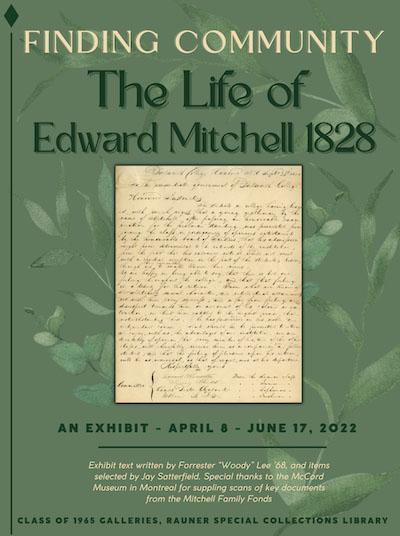Dartmouth in the 1820s
Mitchell entered a Dartmouth that was far different than the school we know today. The student population was small and relatively homogenous. The other students who matriculated in 1824 with Mitchell came from only six states, New Hampshire, New York, Massachusetts, Vermont, Maine and Connecticut. They were faced with a rigid curriculum designed to prepare them for careers in the clergy, law, medicine, and education. But it was a community that welcomed and supported the 32-year-old Mitchell and even invited him to participate in the Social Friends, one of only two fraternal societies on campus.
1. Dartmouth College. Laws of Dartmouth College. Hanover: Dartmouth College, 1828
Call number: Rauner Ref LD1420.5 1828
2. Able Bowen. Engraving, Dartmouth College. John Farmer, Gazetteer for the State of New Hampshire, 1823.
Call number: Iconography 396
3. Unknown Artist. Drawing of Dartmouth College. Circa 1835.
Call number: Iconography 289
4. Catalogue of Books in the Social Friends' Library at Dartmouth College, March, 1824. Concord: Printed by Isaac Hill, 1824.
Call number: DC History Z881 .H254 1824
From the 1780s until the advent of Greek-letter fraternities in the 1850s, social life centered on the Society of Social Friends (of which Mitchell was a member) and the United Fraternity.
Finding Community at Dartmouth
Mitchell had a smooth college course over his four years. He lived first with the Brown family and then with Professor William Chamberlain, Jr., and family for his last three years. The Massachusetts Baptist Education Society supported his college expenses, which Mitchell later repaid. During winter semester breaks, he taught in small-town New Hampshire schools and remained associated with the Baptist brethren at the Hanover-Etna church. Shortly after graduation, Mitchell was ordained by the Church as a Baptist Evangelist.
1. Sarah Parker Parrott, Hanover, to her mother, 11 June, 1828.
Call number: MS 828361
In 1828, Sarah Parrott was in Hanover caring for her brother when she first encountered Mitchell at the breakfast table in the boarding house. She noted that as a student, Mitchell was "very highly respected by the government [i.e., the faculty] and the students." Mitchell's fellow student Alpheus Crosby, reminiscing years later, wrote that "his character, bearing, and intellect were such that he must have been shameless who could have treated him with disrespect."
2. Dartmouth College. Student Account for Edward Mitchell.
Call number: DA-2, Box 1750
During his four years at Dartmouth, the tuition, which included a library fee, was $28 per year, and total expenses—including tuition, room and board, firewood, and the "usual incidentals"—were estimated by the college trustees at $101.87 per year. A five-dollar graduation fee, which went to the college president, was imposed at the completion of studies, and one dollar was charged for the diploma.
3. Edward Michell. “To: Γ Ν Ω Θ Ι Σ Α Υ Τ Ο Ν, [Know Thyself],” Dartmouth Composition, no date. Facsimile courtesy McCord Museum, Montreal.
Call number: McCord, PO 44-A-2.2
Mitchell contends that one who has studied human nature in himself is better prepared to understand human nature in others and in society. He concludes his essay with an eye to the future. "How important then is this knowledge to our own interest? Let the student then with all his getting, get this noble science. It is this that will buy a foundation for his future greatness."
4. Edward Mitchell. "Religious Bigotry," Dartmouth composition, March 26, 1828.
Facsimile courtesy McCord Museum, Montreal.
Call number: McCord, PO44-A-2.5
In his essay on "Religious bigotry," written in his sophomore year, Mitchell deplored the expulsion of Jews and Moors during the reign of Philip III, king of Spain from 1598 to 1621.
5. Edward Mitchell. "Honor and Dignity," Dartmouth composition, April 1824. Facsimile courtesy McCord Museum, Montreal.
Call number: McCord PO44-A-2.8
"But true honour and dignity lie in real virtue…Hence a man rises or falls in the estimation of an enlightened publick in proportion as he is thought to be virtuous or vicious.
6. Edward Mitchell. "While We Live, Let Us Live," Dartmouth composition, undated. Facsimile courtesy McCord Museum, Montreal.
Call number: McCord PO-44-A-3.12
"Therefore whilst within the precinct of an Academy or College, "let us live," as though we felt the work of time and the importance of improving it."
7. Society of Social Friends, Minutes, October 27, 1824.
Call number: DO-2, Box 6249, folder 5
One of Mitchell's presentations to the Social Friends was on "The Age of Pericles"—for him, an unusual departure from subjects related to Christianity. He commented in the introductory paragraph that "Little can be written (by a freshman) within the limits of an essay."
